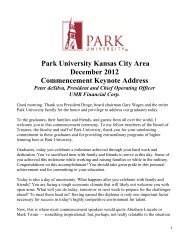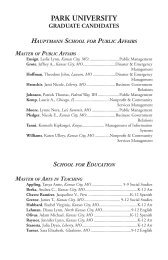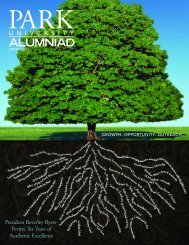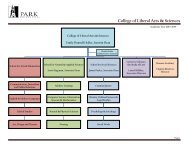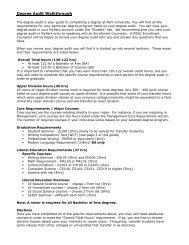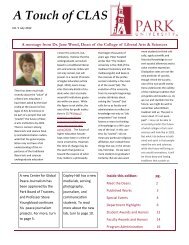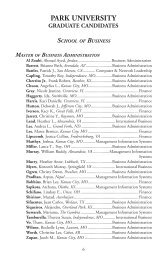How to Write a Radio Serial Drama for Social Development- PDF
How to Write a Radio Serial Drama for Social Development- PDF
How to Write a Radio Serial Drama for Social Development- PDF
Create successful ePaper yourself
Turn your PDF publications into a flip-book with our unique Google optimized e-Paper software.
82 Chapter Five: Character <strong>Development</strong><br />
EXAMPLE<br />
1. NARRATOR: There are times in the life of every nation when change is born.<br />
Those living at the time may not recognize the birth of the changes,<br />
but his<strong>to</strong>rians can trace the exact dates, places, and ways in which<br />
the changes began. In the nation of Brattville, <strong>for</strong> example, in the<br />
year 1912, something was happening; something that would change<br />
the nation and its people <strong>for</strong> ever. It started in a tiny village where<br />
two young men were talking...<br />
2. MUSIC. VILLAGE THEME MUSIC.<br />
(Scene A followed, in which two young men discussed their concerns about work and food and<br />
talked of a dream of a different type of world where everyone had a small family, enough food,<br />
a good job and access <strong>to</strong> health services.)<br />
23. NARRATOR: And that’s how the changes in Brattville began all those years ago.<br />
And look how far Brattville has come <strong>to</strong>day. It is now one of the<br />
world’s most powerful countries.<br />
24. Perhaps something similar is beginning in our nation even now, in<br />
small villages all across the country. Village workshops are being<br />
held everywhere, village workshops that are showing people how<br />
they can run their own small businesses. Is it possible that this is the<br />
beginning of a bigger change The change <strong>to</strong> a nation that no longer<br />
knows poverty<br />
(Scene B followed, in which community members at a village workshop talk about much the<br />
same subjects as those discussed by the two young men in Scene A.)<br />
3. The descriptive narra<strong>to</strong>r. <strong>Write</strong>rs turn <strong>to</strong> a descriptive narra<strong>to</strong>r when<br />
they cannot find any other way <strong>to</strong> “fill in the blanks.” The narra<strong>to</strong>r<br />
might indicate a change in setting, <strong>for</strong> example, by announcing at the<br />
end of a scene, “Meanwhile, at the home of Ben and Belle, there is an<br />
argument taking place.” The drama then shifts <strong>to</strong> the scene with Ben and<br />
Belle. A descriptive narra<strong>to</strong>r also might explain the passage of time by<br />
remarking, “It is now three weeks later, and we find the people of the<br />
<strong>to</strong>wnship still discussing their need <strong>for</strong> a clinic. There is a meeting taking<br />
place at the <strong>to</strong>wn center.”<br />
Descriptive narration should be avoided in a serial because it slows<br />
down the action and detracts from the reality of the s<strong>to</strong>ry. It is always<br />
better <strong>to</strong> indicate changes in place and time through dialogue, as is<br />
discussed and demonstrated in Chapter 6.




